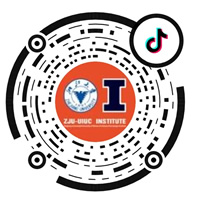At 6:00 pm on August 14th, the 2023 SDG Global Summer School of Zhejiang University closed, and the“Smart City” course offered by Zhejiang University of Illinois Urbana-Champaign Institute (ZJUI) was successfully concluded. There are 2 frontier cross-disciplinary modules, 15 top faculty members, 32 project groups, and more than 200 students from all over the world. Aimed at building a greener future, students and faculty members gathered online to exchange their knowledge of a smart city and immersed themselves in cross-cultural communication during these 15 days.
▲ Faculty members in the“Smart City” course
The“Smart City” course introduced students to the concepts and basics of smart cities through two sections, "Smart Internet of Things and Smart Service Robots" and "Intelligent Transportation & Smart Mobility", to explore the future of green, livable and smart cities. The course brought together a number of experts from the University of Cambridge, Imperial College London, University of Washington, University of Hong Kong, Singapore University of Technology and Design (SUTD), Singapore-ETH Center of ETH Zurich, Zhejiang University and other top universities in the world, including Prof. David Cebon, Fellow of the Royal Academy of Engineering, Prof. Der-Horng Lee, Academician of the Singapore Academy of Engineering; Prof. Tony Q.S. Quek, Academician of the Singapore Academy of Engineering; and Prof. Jenq-Neng Hwang, Fellow of the IEEE, etc.
In addition to the professional courses, the Smart City module also set up a team project to enhance students' communication and collaboration. The project requires students to choose any one of the three topics given and form a team to complete group discussion, planning, topic selection, report writing and presentation.
Sharing between faculty members and students
Q
How can Intelligent Transportation Systems be integrated with electric autonomous vehicles to optimize traffic flow, reduce carbon emissions, and enhance future mobility? What would be the societal, environmental, and economic impacts of such integration have in urban landscapes?
A
Q
How do you improve the performance of perception tasks? For example, if we want to design a powerful detector or tracker, what techniques can we use?
A
Q
Robots of all forms are quietly permeating many aspects of our lives. From intelligent service robots and friendly social robots, to fearless rescue robots, we are benefiting from the advancement of robotics. However, some are warning against the over reliance on robot technology in our society, worrying that they are challenging the very existence of humanity. What jobs do you think will be replaced or created in this impending rise of the robots?
A
Q
Is driving behavior closely related to transport emissions?
A
Bikash Gyawali, a student from Nepal
I found the summer school program really inspiring and I got to know lots of tips from the professor all around the world. I like the smart city course because the classes were really interactive and I got to make lots of friends!
Faria Nishat Shama, a student from the People’s Republic of Bangladesh
Participating in the Smart City Module of ZJU 2023 SDG Global Summer School was instrumental in developing my collaborative and interdisciplinary skills as an industrial design engineer.
As an international student from Bangladesh studying in China, I felt a deep sense of pride to be part of the program, particularly in light of the adoption of SDGs at the UN Sustainable Development Summit. This achievement underscores the importance of global collaboration in achieving sustainable progress and highlights the crucial role of innovative solutions like smart city concepts in addressing urban challenges.







